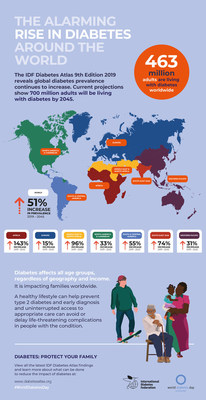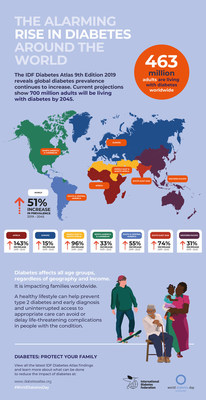International Diabetes Federation: Latest Figures Show 463 Million People Now Living With Diabetes Worldwide as Numbers Continue to Rise

- Country:
- Belgium
On World Diabetes Day, the International Diabetes Federation (IDF) is releasing new figures that highlight the alarming growth in the prevalence of diabetes around the world. 38 million more adults are now estimated to be living with diabetes compared to the results published in 2017. New findings, published today in the 9th Edition of the IDF Diabetes Atlas, show that there are now 463 million adults with diabetes worldwide.

The latest Atlas reports that the global prevalence of diabetes has reached 9.3%, with more than half (50.1%) of adults undiagnosed. Type 2 diabetes accounts for around 90% of all people with diabetes.
The rise in the number of people with type 2 diabetes is driven by a complex interplay of socio-economic, demographic, environmental and genetic factors. Key contributors include urbanisation, an ageing population, decreasing levels of physical activity and increasing levels of overweight and obesity. For reasons which are unknown, type 1 diabetes is also on the rise.
"Diabetes is a serious global health issue that has a huge socio-economic impact that cannot be ignored," said IDF President, Professor Nam H. Cho. "The rising prevalence of diabetes is a real cause for concern, especially when we consider the high number of people who remain undiagnosed. We must do more to prevent type 2 diabetes, diagnose all forms of diabetes early and prevent complications. We must also ensure that every person with diabetes has affordable and uninterrupted access to the care they need."
Diabetes has an impact on all age groups, regardless of geography and income. More than 1.1 million children and adolescents younger than 20 years are living with type 1 diabetes, while three in every four people with diabetes (352 million) are of working age (20-64 years). One in five people over 65 has diabetes. The rise in prevalence is putting a strain on the capacity of countries to guarantee regular and affordable access to essential medicines and appropriate care. This leaves many struggling to manage their diabetes, placing their health at serious risk.
When their diabetes is undetected or they are inadequately supported, people with diabetes are at risk of serious and life-threatening complications, such as heart attack, stroke, kidney failure, blindness and lower-limb amputation. These result in reduced quality of life and higher healthcare costs, and place undue stress on families.
"The IDF Diabetes Atlas provides information for those who have to make decisions about diabetes care and prevention and for those who seek to influence such decisions," said IDF Diabetes Atlas Committee Chair, Professor Rhys Williams. "A considerable amount of research and new evidence has been collated for the 9th edition. We have seen an improvement in the number of in-country studies that support our estimates and projections, as we endeavour to inform the diabetes community and the wider public about the condition's prevalence around the world".
Much can be done to reduce the impact of diabetes. Evidence suggests that type 2 diabetes can often be prevented, while early diagnosis and access to appropriate care for all types of diabetes can avoid or delay complications in people living with the condition.
Other key findings from the IDF Diabetes Atlas 9th Edition include:
- The total number of people with diabetes is predicted to rise to 578 million by 2030 and to 700 million by 2045.
- 374 million adults have impaired glucose tolerance, placing them at high risk of developing type 2 diabetes.
- Diabetes was responsible for an estimated USD 760 billion in health expenditure in 2019.
- Diabetes is among the top 10 causes of death, with almost half of deaths occurring in people under the age of 60 years.
- One in six live birth are affected by hyperglycaemia in pregnancy.
For more information and supporting data about the national, regional and global prevalence of diabetes included in the IDF Diabetes Atlas 9th Edition, visit https://www.diabetesatlas.org?utm_source=media&utm_medium=email&utm_campaign=world_diabetes_day_2019_press_release
About the IDF Diabetes Atlas
The IDF Diabetes Atlas is an authoritative resource on the global impact of diabetes. First published in 2000, it is updated periodically by IDF in collaboration with experts from around the world and contains data on diabetes prevalence, mortality and expenditure on global, regional and national levels. The IDF Diabetes Atlas draws attention to the importance and growing impact of diabetes in all countries and IDF Regions. www.diabetesatlas.org
About the International Diabetes Federation
The International Diabetes Federation (IDF) is an umbrella organisation of over 230 national diabetes associations in 170 countries and territories. It represents the interests of the growing number of people with diabetes and those at risk. The Federation has been leading the global diabetes community since 1950. www.idf.org
Photo - https://mma.prnewswire.com/media/1028023/IDF_Infographic.jpg










